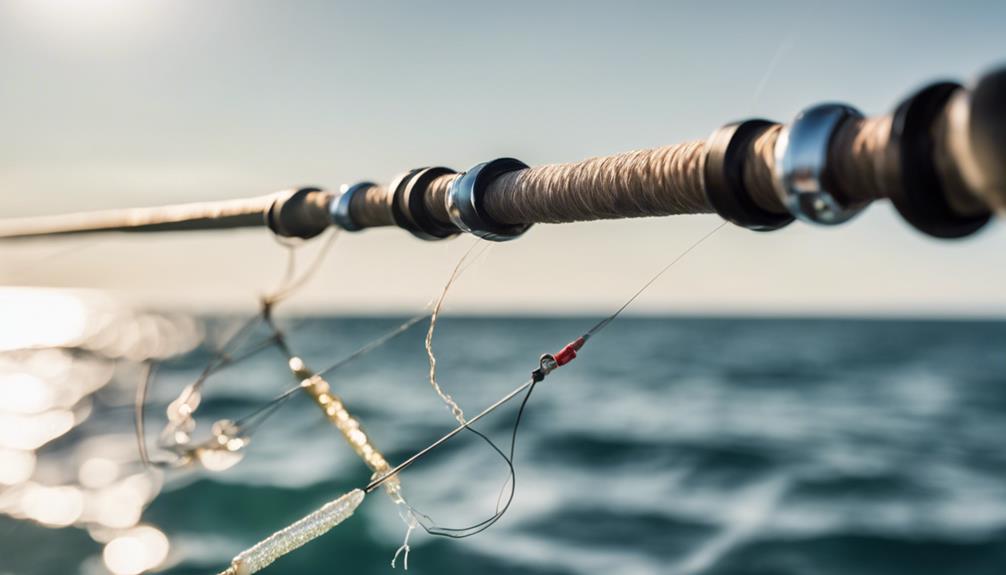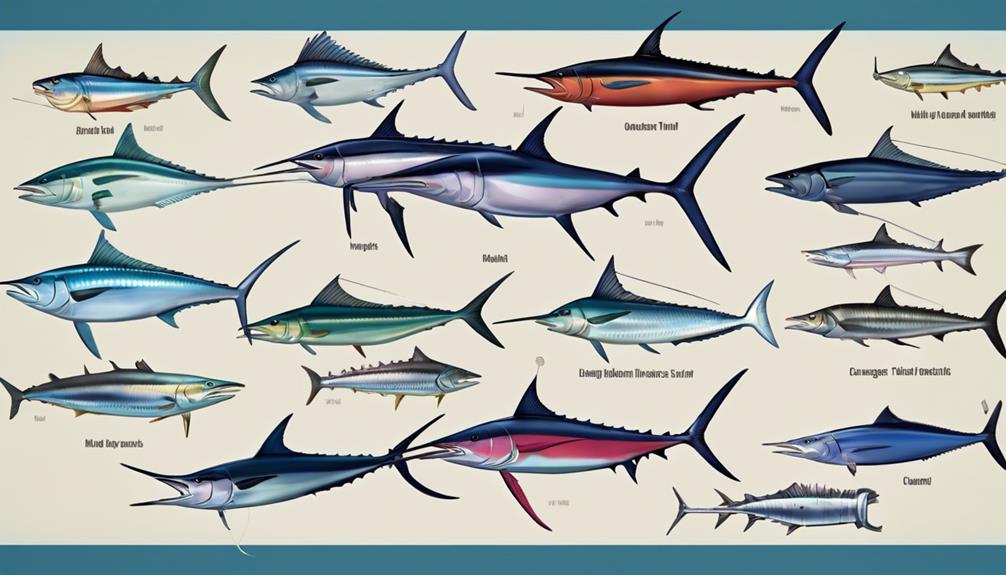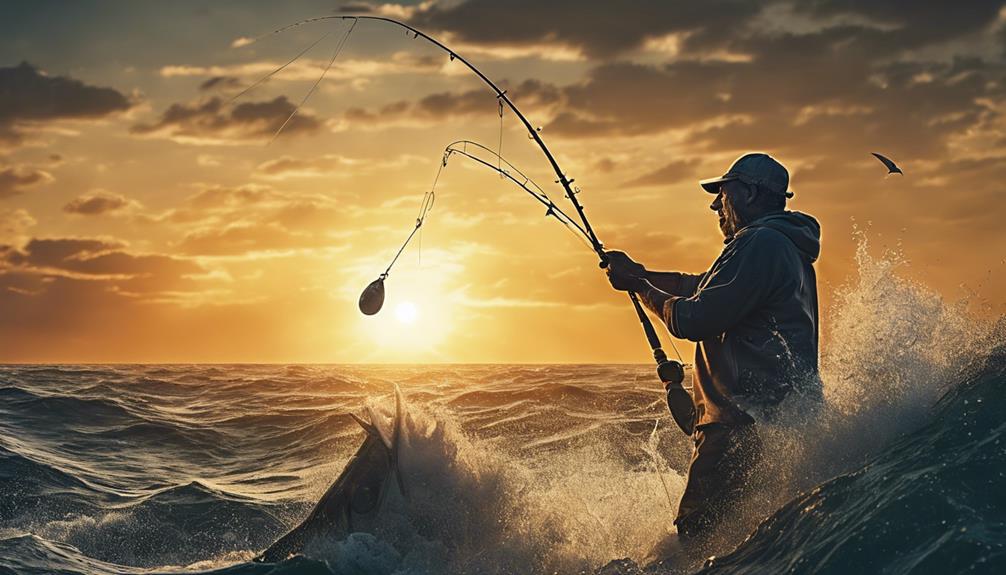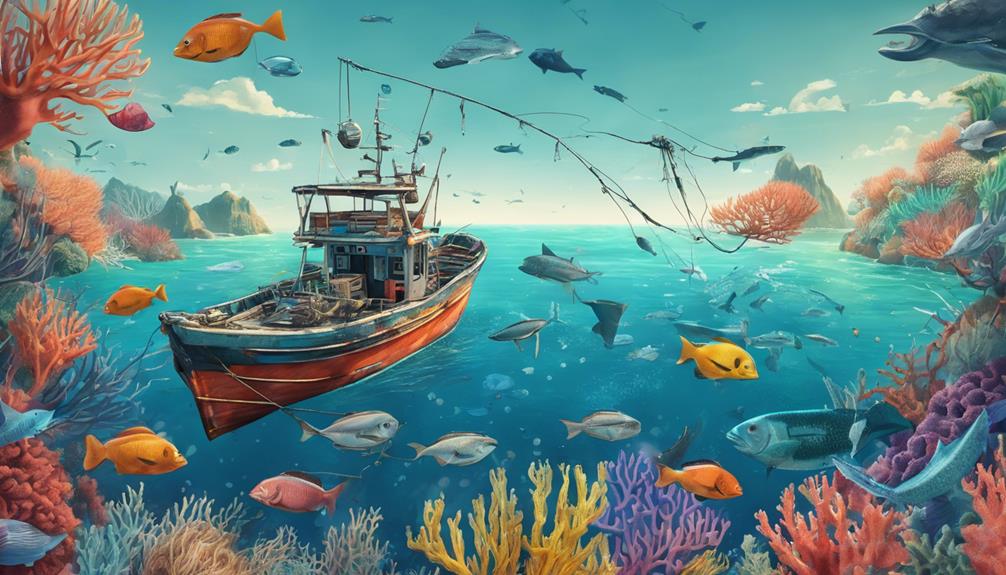Embarking on a deep sea fishing adventure can be an exhilarating experience, but proper preparation is key to ensuring a successful outing. From selecting the right gear to understanding safety measures, there are crucial steps to take before setting sail.
Imagine the thrill of reeling in a massive catch under the vast expanse of the open sea. But what if unexpected challenges arise? Stay tuned to discover expert tips that will help you navigate the waters with confidence and make the most of your deep sea fishing expedition.
Selecting the Right Gear
When gearing up for your deep sea fishing adventure, ensure you select the right gear to enhance your experience. Proper gear maintenance is crucial for a successful trip. Before heading out, check your equipment for any signs of wear and tear. Inspect your reels, rods, and lines to ensure they're in good condition. Clean your gear after each use to prevent saltwater corrosion, which can damage your equipment over time.
Tackle selection is another essential aspect to consider. Depending on the type of fish you're targeting, you'll need different tackle. Research the species you're likely to encounter in the deep sea and choose your tackle accordingly. Make sure you have a variety of hooks, sinkers, and lures to adapt to different fishing conditions. Organize your tackle box efficiently so you can quickly access what you need during the trip.
To optimize your fishing experience, invest in quality gear that suits your skill level. Consider the weight and action of your rod, the type of reel, and the strength of your line. Having the right gear not only increases your chances of success but also makes the whole experience more enjoyable. So, take the time to maintain your gear and select the appropriate tackle for a rewarding deep sea fishing adventure.
Understanding Safety Measures
Ensure your deep sea fishing adventure isn't only successful but also safe by understanding essential safety measures. When heading out into the deep waters, it's crucial to be prepared for any unforeseen circumstances. Familiarize yourself with the emergency protocols on the boat before setting sail. The crew will provide instructions on how to act in case of emergencies such as man overboard situations, fires, or extreme weather conditions. Pay close attention during these briefings as they could make a significant difference in ensuring everyone's safety.
Moreover, familiarize yourself with the location and proper use of all lifesaving equipment on board. This includes life jackets, life rafts, and any other flotation devices. Ensure that you know how to properly wear a life jacket and where to find additional safety equipment in case of an emergency. Being prepared and knowledgeable about these tools can save lives in critical situations.
Packing Essential Supplies
To prepare for your deep sea fishing adventure, pack essential supplies that will ensure your comfort and safety throughout the trip. When packing for your excursion, consider the following:
- Tackle organization: Keep your fishing gear neat and accessible by using tackle boxes or bags with compartments. Organizing your tackle will save you time and frustration when trying to locate specific gear during the trip.
- Food storage: Bring along a cooler with ice packs to store perishable items like sandwiches, fruits, and drinks. Proper food storage is essential to prevent spoilage and keep your sustenance fresh throughout the day.
- Sun protection: Don't forget to pack sunscreen, sunglasses, and a hat to shield yourself from the sun's harsh rays. Spending hours out at sea without protection can lead to sunburn and discomfort.
- First aid kit: Be prepared for minor injuries by packing a basic first aid kit that includes bandages, antiseptic wipes, pain relievers, and seasickness medication. Having these supplies on hand can address common issues that may arise during the trip.
- Rain gear: Weather conditions can change rapidly at sea, so pack a waterproof jacket or poncho to stay dry in case of rain. Staying warm and dry will help you stay comfortable and enjoy your fishing experience to the fullest.
Checking Weather Conditions
Before embarking on your deep sea fishing adventure, it's crucial to check the weather conditions to ensure a safe and enjoyable experience. Weather monitoring is essential before heading out into the open sea. Start by checking the local weather forecast updates to get an idea of what conditions to expect during your trip.
By keeping an eye on the weather, you can plan accordingly and make any necessary adjustments to your fishing excursion. Be sure to look out for any potential storms or rough seas that could pose a risk to your safety. Weather monitoring tools like apps and websites can provide real-time updates on changing conditions, allowing you to stay informed throughout your journey.
It's important to remember that weather conditions at sea can be unpredictable, so staying informed is key to a successful deep sea fishing trip. Regularly checking for forecast updates will help you make informed decisions about whether it's safe to proceed with your plans or if it's better to reschedule for another day. By being proactive and monitoring the weather closely, you can ensure a smoother and more enjoyable fishing experience.
Researching Fishing Locations
Once you've checked the weather conditions, the next step is to research fishing locations for your deep sea adventure. Here are some key points to consider while researching fishing locations:
- Scouting Hotspots: Look for fishing hotspots known for abundant marine life. These areas are often frequented by experienced anglers and are more likely to result in a successful fishing trip.
- Comparing Amenities: Consider the amenities offered at different fishing locations. Some may have better-equipped boats, comfortable facilities, or additional services that can enhance your overall experience.
- Exploring Local Regulations: Familiarize yourself with the local fishing regulations and restrictions in the area you plan to visit. Ensure you comply with size limits, bag limits, and any other rules to avoid fines or penalties.
- Seeking Guides: If you're unfamiliar with the area or new to deep-sea fishing, consider hiring a local guide. A knowledgeable guide can provide valuable insights, improve your chances of catching fish, and ensure a safe excursion.
Researching fishing locations is crucial to maximizing your deep sea fishing adventure. By scouting hotspots, comparing amenities, exploring local regulations, and seeking guides, you can increase your chances of having a successful and enjoyable fishing experience.
Booking a Reputable Charter
When booking a reputable charter for your deep sea fishing adventure, ensure you thoroughly research the charter company's credentials and customer reviews. Start by checking the captain's credentials and experience. A seasoned captain with extensive knowledge of the waters can make a significant difference in the success of your fishing trip. Look for captains who've a proven track record of successful fishing outings and prioritize safety above all else.
Additionally, it's crucial to read charter reviews to understand the experiences of past customers. Reviews can provide valuable insights into the quality of service, the condition of the boat, and the overall satisfaction of previous clients. Pay attention to recurring themes in the reviews, such as punctuality, professionalism, and the captain's ability to put guests on fish.
When evaluating charter pricing, remember that the cheapest option may not always be the best. Consider the inclusions and amenities offered by each charter, as well as the overall value for the price. Some charters may provide fishing gear, bait, and even snacks or beverages, while others may charge extra for these services. By carefully comparing pricing and offerings, you can select a charter that meets your budget and provides an excellent deep sea fishing experience.
Learning Basic Fishing Techniques
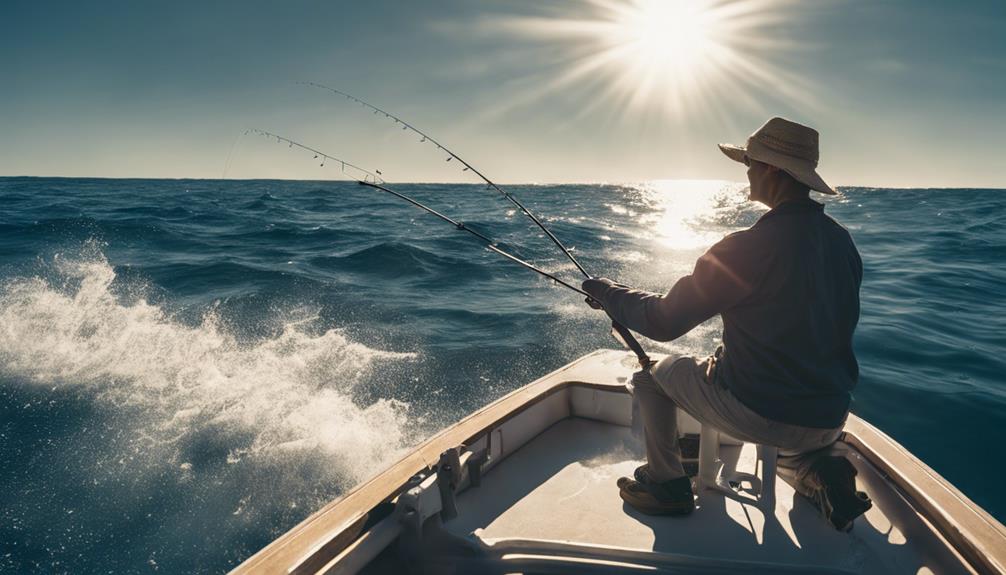
To make the most of your deep sea fishing adventure, familiarize yourself with basic fishing techniques that will enhance your experience on the water. Understanding casting techniques and fish behavior can significantly increase your chances of a successful catch. Practice different casting methods to improve your accuracy and distance. Additionally, learn about the behavior of the fish you're targeting, such as their feeding habits and preferred depths, to strategically place your bait.
When it comes to fishing, knot tying and bait selection are crucial skills to master. Ensure you can tie strong and reliable knots to secure your hooks, lures, or sinkers properly. Practice tying common fishing knots like the improved clinch knot or the Palomar knot. Moreover, experiment with different types of bait to attract the specific fish species you're aiming for. Fresh bait is often more appealing to fish, so consider using live bait when possible.
- Practice casting techniques to improve accuracy
- Learn about fish behavior to target them effectively
- Master essential knot tying skills for securing your gear
- Experiment with various bait options to attract fish
- Use fresh bait for increased success in catching fish
Preparing for Seasickness
Consider stocking up on seasickness prevention supplies before embarking on your deep sea fishing adventure. Seasickness can put a damper on your experience, but there are ways to combat it. Start by looking into natural remedies like ginger candies or acupressure wristbands. These can help alleviate symptoms without the side effects that some medications may cause. Additionally, mental preparation plays a significant role in managing seasickness. Before heading out, visualize yourself on the boat, feeling strong and steady. This positive mindset can help reduce anxiety and prevent the onset of seasickness.
In addition to natural remedies and mental preparation, there are other steps you can take to minimize the chances of getting seasick. Make sure to get plenty of rest the night before your trip and avoid heavy or greasy foods. Staying hydrated is also crucial, so be sure to drink water regularly throughout the day. While on the boat, focus on the horizon to help your body adjust to the motion of the waves. If you start feeling queasy, consider taking slow, deep breaths to help calm your stomach.
Frequently Asked Questions
How Can I Ensure I Am Properly Licensed and Permitted for Deep Sea Fishing?
To make sure you're ready for deep sea fishing, start by verifying your license and applying for any necessary permits. Check that you're in compliance with fishing regulations to avoid any issues. It's important to have all the right paperwork in order before heading out on your adventure.
Double-check everything to ensure you can fish legally and enjoy your time on the water without any worries.
What Are Some Common Etiquette Rules to Follow While on a Deep Sea Fishing Charter?
When on a deep sea fishing charter, it's crucial to follow common etiquette rules. Be mindful of proper attire for the trip, and remember to engage in positive social interactions with your fellow anglers and crew members.
Respect fishing techniques and always prioritize boat safety to ensure a smooth and enjoyable experience for everyone on board. By adhering to these guidelines, you'll contribute to a pleasant and harmonious deep sea fishing adventure.
Are There Any Specific Regulations or Restrictions I Should Be Aware of When Fishing in Certain Locations?
When fishing in certain locations, it's crucial to be aware of conservation measures and local regulations. Some areas have protected species and catch limits that you must follow.
Ensure you check the specific rules for the location you'll be fishing in to avoid any issues. By respecting these regulations, you can help preserve the marine environment and ensure sustainable fishing practices.
Always stay informed and fish responsibly to protect the ocean's biodiversity.
What Is the Best Way to Properly Handle and Release Any Fish I Catch During My Deep Sea Fishing Trip?
When you catch a fish during your deep sea fishing trip, it's crucial to handle it properly for conservation.
Use barbless hooks if possible to minimize harm. Keep the fish in the water as much as you can, supporting its body gently. Avoid touching its gills or eyes.
Use proper catch and release techniques by quickly unhooking the fish and releasing it back into the water. This helps ensure the fish's survival and maintains a healthy ecosystem.
How Can I Effectively Communicate With the Crew and Captain of the Charter to Make the Most of My Fishing Experience?
To make the most of your fishing experience, effective crew communication is key. Discuss your goals and preferences with the captain for personalized tips.
Ask about proper fishing techniques and equipment maintenance to enhance your trip.
Clear communication ensures everyone is on the same page, leading to a successful and enjoyable deep sea fishing adventure.
Conclusion
Now that you're equipped with the right gear, safety knowledge, supplies, and fishing techniques, you're all set for your deep sea fishing adventure.
Remember to check the weather conditions, research fishing locations, book a reputable charter, and prepare for any seasickness.
With proper preparation, you'll be able to fully enjoy the thrill of deep sea fishing and make unforgettable memories out on the water.
Have a fantastic time reeling in those big catches!
